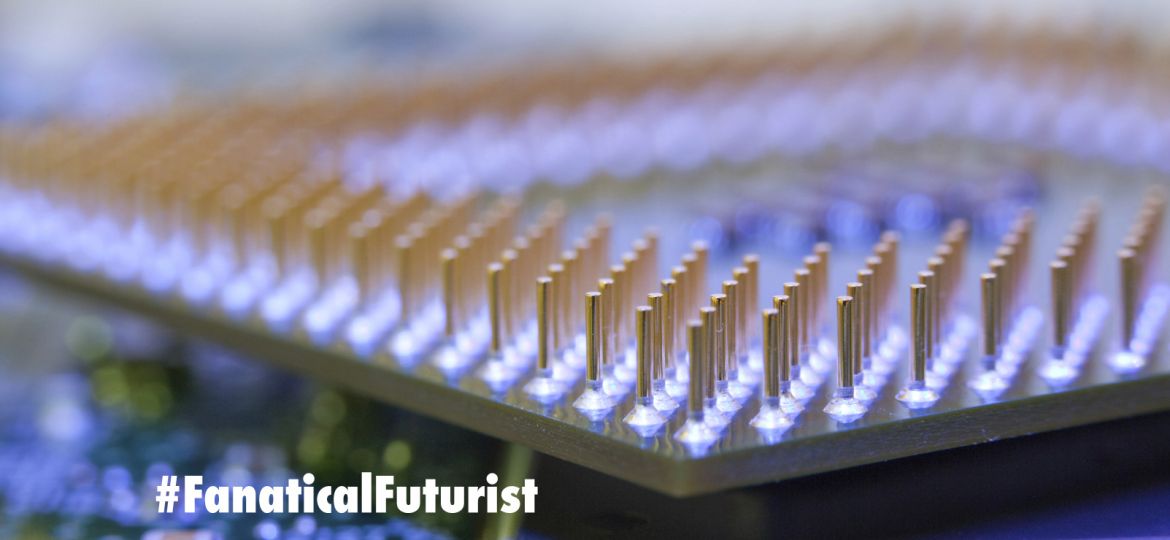
WHY THIS MATTERS IN BRIEF
Quantum computers are on track to be the most powerful form of computing ever and once we start seeing systems that go beyond the 50 qubit mark we will be able to use them to solve some of the world’s most complicated problems.
At the IEEE Industry Summit on the Future of Computing in Washington DC on Friday, IBM announced they’re developing a quantum computer that will be capable of handling 50 qubits, and along with Google’s own recent announcement that they hope to be the first company to achieve Quantum Supremacy, which is the term given to a quantum computer that can outperform any classical computer on the planet, it now means that we have not one but two companies racing ahead of the pack to create the most powerful quantum computer ever built.
Seen by experts as the future of advanced computing, quantum computers work rather differently to traditional computers. Instead of processing information using binary bits of 0s and 1s, a quantum computer uses qubits, which can simultaneously be a 0 and/or a 1, an effect known as superposition, and it’s this phenomenon that makes them so incredibly powerful.
Aside from their 50 qubit machine IBM also announced they already have a smaller 20 qubit quantum computer that’s accessible to third party developers as a service via their cloud computing platform and that they managed to maintain the quantum state for both systems for a total of 90 microseconds. While that might seem a short amount of time it’s still enough to be able to run short complex calculations, and sustaining the life of qubits is still one of the biggest challenges facing the industry.
“We are really proud of this announcement, it’s a big frickin’ deal,” said Dario Gil, IBM’s director for AI and Quantum Computing Dario Gil.
IBM has been making significant advances in quantum computing ever since their researchers first helped to create the field of quantum information processing back in the 90’s, but they aren’t the only ones in on the race to build the world’s first large, working quantum computer.
Google, Intel, who recently unveiled their latest 17 qubit chip, and Microsoft, and also China, who recently dropped $10 Billion to open a new national quantum technology lab, are also developing their own quantum computing systems, and San Francisco based startup Rigetti also wants to revolutionise the field. Then meanwhile Canadian quantum computing company D-Wave has already developed a couple of quantum computers that have been sold to NASA and Google, and although their latest system surpassed the 2,000 qubit mark, and previous systems have shown that they can operate over a hundred million times faster than classical computers, many experts in the field still debate whether or not in fact their systems can actually be classified as quantum computers – something that D-Wave executives continually scoff at.
50 qubit quantum computers can perform extremely large, extremely difficult computational tasks, but despite IBM’s announcement it’s also very clear that their machine isn’t yet ready for widespread, commercial, or personal use, because like all of today’s quantum computers IBM’s 50 and 20 qubit systems still need highly specialised conditions in order to operate.
Furthermore, as University of Maryland professor Andrew Childs pointed out after the announcement IBM hasn’t yet published the details of their new machine in a peer reviewed journal, but that will likely come soon. Hopefully anyway.
“IBM’s team is fantastic and it’s clear they’re serious about this, but without looking at the details it’s hard to comment,” he said, adding that more qubits doesn’t necessarily translate to a leap in computational ability, “those qubits might be noisy, and there could be issues with how well connected they are.”
In other words noisy qubits make for an inaccurate quantum computer and an inaccurate computer isn’t as valuable as an accurate one…
However, all that said all of this is bringing us closer to seeing the day when quantum computing revolutionises not just computing, but a whole host of industries that are lining up to use them to solve many of the world’s most difficult problems.
“We’re at world record pace. But we’ve got to make sure non-physicists can use this,” added Gil.
















